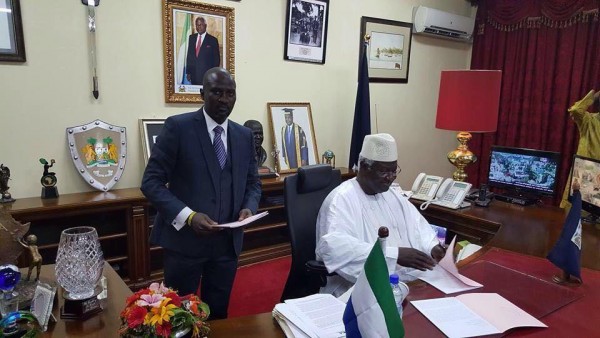
By Jarah Kawusu-Konte–
It is also expected that programmes and activities coded in political party manifestos help to build optimism of serving mankind and making life meaningful for voters. It’s on this premise that the people of this country voted for the APC twice in 2007 and 2012 respectively. But a ponytail group of detractors are hellbent on misinforming the public about the true state of affairs on the ground.
Electricity generation and distribution in Sierra Leone prior to 2007 could be described as perennial and ailing; a view shared by many Sierra Leoneans. The creation of socio-economic infrastructure and the provision of energy are vital functions for the realisation of sustainable economic growth and human development. Improving the country’s energy sector is one of government’s foremost objectives. This critical priority was articulated in the Agenda for Change, which was unveiled in 2007 and reinforced in the transformative Agenda for Prosperity.
The overall objective of the energy sector is to ensure increased, reliable and efficient supply of electricity for households, small and medium enterprises and improve the operational performance of the National electricity distribution utility. For instance, Kono and Makeni which had been in perennial darkness for over 30 years are now enjoying electricity. Electricity supply and distribution has increased from below 20 megawatts inherited from the SLPP to now over 168 megawatts. This is a significant improvement. A great leap forward under the transformative leadership of President Koroma. Solar Street lights have been installed in all district headquarter towns/cities. Certainly, solar Street lights among other things will improve and enhance safety and security in communities, improve lighting for road users, pedestrians and vehicular movement as well as improving night life and promoting growth in especially urban areas.
The provision of water is an avowed objective of this administration. The significance and centrality government attaches to the provision of water to the populace made government to create a separate Ministry to tackle the problem. Water, they say is life. The government therefore put together the National Water and Sanitation Policy (NWSP) which contains ambitious targets of extending national water supply and Sanitation coverage to 66% and 74% respectively. The three towns water project for Makeni, Bo and Kenema is underway – Makeni has already started enjoying this as taps were opened after 20 years. Bo and Kenema are next in line. Kailahun also got pipe borne water after 25 years. Port Loko, Kambia, Lungi, Pujehun are all currently enjoying clean pipe borne water. Moyamba, Mattru Jong and Kabala will all begin to enjoy pipe borne water in the next few weeks as the projects will be completed in June/July this year. The sector is undergoing profound change and the Ministry of Water Resources, in partnership with other actors, is pursuing a number of reforms. Firstly, we are taking steps to improve water resources management at national, district and local levels, to ensure that the country’s water resources are managed in a sustainable way to ensure availability for all users/uses.
Infrastructural development under this government is a huge success as tangible evidence of transformation of the sector is evident all across the country. The country’s road network was deplorable and pathetically shameful. It was indeed in a bad shape. The 4 lane Wilkinson Road, 4 lane Spur Road, Regent- Grafton Road, Kenema-Pendembu highway, Lungi-Port Loko highway, Kono highway (soon to be completed), Makeni-Kamakwie (soon to be completed), Makeni-Kabala highway (soon to be completed), Moyamba Junction-Moyamba township (under construction), Hillside Byepass Road (under construction) and Lumley-Tokeh road (also under construction) and the roads done in all district headquarter towns are clear evidences of work being done to overcome the bad road network of the past. But the list is endless.
Agriculture being one of the thematic pillars prioritized by President Koroma’s Agenda for Change has also experienced a massive turn around. It could be recalled that President Koroma in 2007 made agriculture one of his top list of priorities with a vision to transforming the sector to act as the engine of socio-economic growth and development through commercialization and the promotion of the private sector, including farmers, farmer-based organizations. Government significantly increased the budgetary allocation to the sector from a paltry 1.6% inherited from the last government to the current 10% being allocated by the National budget, and embarked on the process of developing a comprehensive roadmap for the long-term development of the sector within the African Union’s Comprehensive Africa Agriculture Development Programme commonly known as the CAADP process. This process, the president once said, “led to the formulation of the National Sustainable Agricultural Development Programme (NSADP), which focused attention on smallholder farmers which led to the conceptualisation and formulation of the Smallholder Commercialization Programme (SCP), popularly known as “Farm for Business”. Seed distribution to farmers started in earnest last year to gain maximum productivity in the planting season. The Agriculture Ministry has distributed rice seeds to over 73,000 farmers and fertilisers to over 35,000 farmers. 1,376 kilometers of feeder roads have been completed to connect target crops to markets. 20 Agricultural Business Centers (ABCs) have been transformed to drive agro-processing facilities, 68 Farming Support Associations around 5,000 farmers have received support through equipment and access to finance to sustain their activities.
Amid the devastating effects of the unprecedented Ebola outbreak, government fulfilled its promise and increased salaries for all public sector workers, paramount chiefs, councilors, teachers and lecturers. Under this government, there has been an increase in the minimum wage from Le21,000 to Le500,000 and paid school fees for 1.1 million students for two years, cured 29,000 children of malnutrition, 9,000 schools are now using new core content for accelerated learning, 206 new classrooms built in previously overcrowded schools and free health care introduced in 2010 for pregnant women, lactating mothers and children under five.
In 2008, the government of SL improved on its commitment to fight corruption through legislation empowering the ACC with independent investigative and prosecutorial powers without recourse to the office of the Attorney General and Minister of Justice as well as strengthening the ACC itself through adequate budgetary support. The government has adopted two national anti-corruption strategies, which focused on prevention and constructive engagements. The current strategy (2008-2013) came to an end in 2013. This gave rise to the crafting of the new five-year national Anti-Corruption Strategy (2014-2018). The Pay-No-Bribe campaign was launched by President Koroma to directly tackle corruption by enabling members of the public to report corruption and providing institutions with the necessary information, cleaning of payrolls in health and education – ghost teachers and workers under the former administration, strengthened and gave relevance to the Auditor-General’s department, institutional reforms like the performance contract and management system, the Legal Aid Board, Disability Commission, Youth Commission, Public Private Partnership, Millennium Challenge Corporation Coordinating Unit, National Protected Area, the Corporate Affairs Commission and Small and Medium Enterprises Development Agency, Local Content Agency among others.
From the foregoing, it’s quite clear this government is on the right path to achieve sustainable development for all its citizens. Whether our detractors face the reality on the ground or not, the people know the truth because they are feeling it. No need to go back and forth on this. The evidence is out there for all to see and acknowledge.



